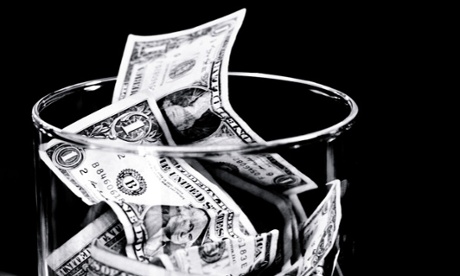
“She tried to tip a barman.” When I confessed this to my British coworkers, they were horrified. I had just recounted how I tried to tip a barman in Dublin by asking him to break a €5 bill and telling him that he only needed to give me €4 back; they tut-tutted and shook their heads.
“How would you feel if someone tried to give you a dollar every time you wrote a story?” they said. It seems that while visiting Dublin and London this month, I regularly insulted barmen, servers and hotel workers – many of whom seemed as uncomfortable at being tipped as I felt about not tipping them.
Maybe it was the coins that made it feel grubby? Tipping in Europe feels a little bit condescending: you often have to do it with coins, since the smallest paper note is either a €5 or £5 bill. But I am so hardwired to tip that it felt awful not to. However, when people are properly paid for the jobs that they are doing, they do not need your tips, I was told.
And yet there I was, tipping people in Europe just to make myself feel better. Wasn’t I grand? Wasn’t I a generous American, who could afford to tip? In my defense, I was not doing it to show off or to make myself feel superior to those who “served” me. It was because I had always been taught that tipping is the right thing to do.
I started working in restaurants full time at 19. And when I started at the Guardian seven years later, I was still spending my weekends mixing bloody mary mix, hauling high chairs and managing a team of fabulous brunch bunnies. As a manager I did not rely on tips, but the women and men I worked with did.
Most people who have worked in restaurants who I know have a love/hate relationship with tipping.
In some restaurants servers can make as much as $30-$40 an hour in tips; in others they barely make minimum wage. In the US there are still some states where it is legal to pay tipped employees $2.13 an hour. You read that right: two dollars and 13 cents. That is a legal minimum wage for millions of US workers.
Tip money can be good – great, even – but often it comes at a cost. Ultimately, it’s the customers who pay your bills, and if that means letting them flirt or stare at your chest a while longer than acceptable in order to get a bigger tip, then so be it. I have seen it first-hand.
“There is a running joke in the industry that if you are not being sexually harassed, then you are not doing it right,” a bartender told me last year when I was reporting a piece on sexual harassment in the food and drink industry. A report released a year ago by Restaurant Opportunities Centers United found that four out of five women in the restaurant industry experience some form of sexual harassment from customers.
The whole system around tipping can be used as a weapon – and not just against servers. The same way that customers make snap judgments about servers – not sexy enough, not friendly enough, not fast enough – servers make similar judgments about customers. Young customers, foreign customers and, yes, customers of color all get worse service because servers often assume they will not tip.
Once when I took my mom for a birthday lunch to a New York City restaurant, we spoke Slovak during most of the meal. The server dropped the check before we could even order a dessert. The check included an automatic 18% gratuity. I was mortified.
All of this is the reason I tip. I have been programmed – or brainwashed, if you will – to believe that I am responsible for making sure these servers have enough money at the end of the day to pay their bills. It’s a way to say thanks: thank you for serving me today, thank you for being a part of my experience.
My discomfort around not tipping is a product of all that. It’s also how US restaurants get away with paying their workers such low wages. They make us believe it has always been that way, that their business would go under if they had to pay their staff regular wages.
If I have learned anything from my trip, it’s that it is possible to create a culture where servers, hotel workers and other employees do not have to rely on tips to make ends meet.
So go ahead, Danny Meyer, end tipping. It might make me uncomfortable, but it’s the right thing to do.

